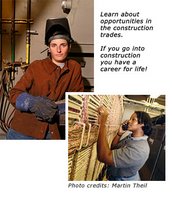Failing with A College Degree--Succeeding Without One
 In the US, a person can get rich without a college degree. In fact, a person can get rich without a high school diploma, in the US. The secret is to learn a skill that is in demand. Charles Murray of "Bellcurve" fame suggests that the fixation on a college degree for everyone of above average intelligence is hurting many students. I can add that it is also hurting the US economy.
In the US, a person can get rich without a college degree. In fact, a person can get rich without a high school diploma, in the US. The secret is to learn a skill that is in demand. Charles Murray of "Bellcurve" fame suggests that the fixation on a college degree for everyone of above average intelligence is hurting many students. I can add that it is also hurting the US economy.There is no magic point at which a genuine college-level education becomes an option, but anything below an IQ of 110 is problematic. If you want to do well, you should have an IQ of 115 or higher. Put another way, it makes sense for only about 15% of the population, 25% if one stretches it, to get a college education. And yet more than 45% of recent high school graduates enroll in four-year colleges.Source.
...The good news is that market-driven systems eventually adapt to reality, and signs of change are visible. One glimpse of the future is offered by the nation's two-year colleges. They are more honest than the four-year institutions about what their students want and provide courses that meet their needs more explicitly. Their time frame gives them a big advantage--two years is about right for learning many technical specialties, while four years is unnecessarily long.
Advances in technology are making the brick-and-mortar facility increasingly irrelevant. Research resources on the Internet will soon make the college library unnecessary. Lecture courses taught by first-rate professors are already available on CDs and DVDs for many subjects, and online methods to make courses interactive between professors and students are evolving. Advances in computer simulation are expanding the technical skills that can be taught without having to gather students together in a laboratory or shop. These and other developments are all still near the bottom of steep growth curves. The cost of effective training will fall for everyone who is willing to give up the trappings of a campus. As the cost of college continues to rise, the choice to give up those trappings will become easier.
....The spread of wealth at the top of American society has created an explosive increase in the demand for craftsmen. Finding a good lawyer or physician is easy. Finding a good carpenter, painter, electrician, plumber, glazier, mason--the list goes on and on--is difficult, and it is a seller's market. Journeymen craftsmen routinely make incomes in the top half of the income distribution while master craftsmen can make six figures. They have work even in a soft economy. Their jobs cannot be outsourced to India. And the craftsman's job provides wonderful intrinsic rewards that come from mastery of a challenging skill that produces tangible results. How many white-collar jobs provide nearly as much satisfaction?
The most common route to wealth in the US is through your own business. A good electrician, plumber, contractor etc. might have never graduated from high school, yet be good enough at his trade and at business to become quite wealthy over time.
A lot of students go to college because it is expected of them. Discovering that they are not interested in the extra two, four, six + years of additional education they need to get anywhere in most professions is an unwelcome insight. That epiphany may leave a person with a college degree working as unskilled labour.
How much better it would be to include practical training all along--from grammar school on? A high school student should have at least one skill that would earn him double minimum wage. A high school graduate should have two. A graduate of an additional one or two years of education past high school should be able to earn triple minimum wage, or higher if they have any business skills.
The emphasis on college or nothing is hurting a lot of people, and the economy as well.
Labels: competence, education, maintenance, Psychological neoteny

0 Comments:
Post a Comment
“During times of universal deceit, telling the truth becomes a revolutionary act” _George Orwell
<< Home